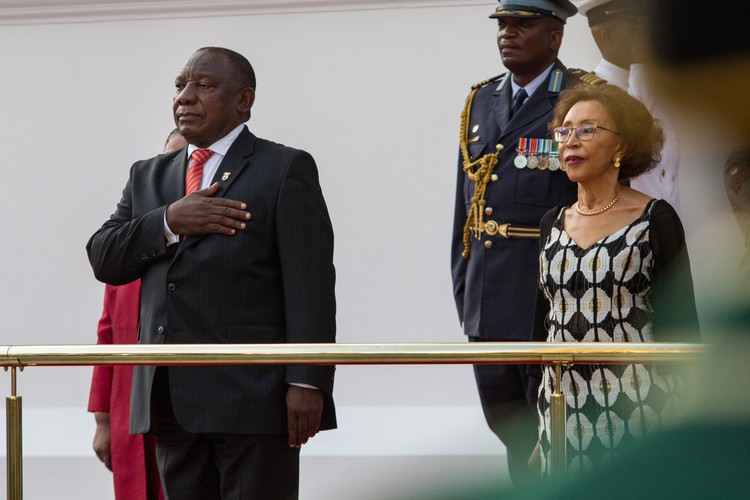
President Cyril Ramaphosa at the opening of Parliament earlier this year. Photo: Ashraf Hendricks
24 March 2020
We, a coalition of unions, co-operatives, feminist collectives, informal and formal workers, organisations and allies commend the Presidency for swift action in declaring a national State of Disaster to curb the impact of the Corona virus (Covid-19) in South Africa.
However, we are worried and are compelled to raise our concerns about the grave risks to both health and economic security that Covid-19 presents to precarious workers, including domestic workers, sex workers, women farm workers, health care workers, informal traders, shop assistants, recycling co-operatives and other. Our work should not cost us our lives. Over the past two weeks we have been inundated with calls from workers who say:
Precarious workers make use of mass transport systems (taxis and buses) to get to and from work, areas the WHO and National Department of Health have deemed as high risk for infection. Furthermore, domestic workers and health care workers work in intimate spaces with people who are at high risk of Covid-19 infection, such as the elderly and people who have travelled to and from high-risk countries. However, due to the legacy of inequality we continue to live in, these are the very same workers who will not be paid – and cannot afford – to self-quarantine. Without income, they also cannot afford healthy food or medication, making them even more vulnerable.
We commend the government for communicating around Covid-19, however, gaps remain in addressing the anxiety, fear and stigma related to infection. On top of the fear of dying, vulnerable workers reside in communities where the potential is high for stigmatisation and discrimination in the event of self-quarantine or being identified as having the virus.
We believe that a successful response to Covid-19 requires unity among all who live in South Africa, and our platform aims to be part of a unified solution. That unified response however, requires government to take bold and deliberate steps to ensure that the most vulnerable members of society are cared for and have their dignity and livelihoods secured. Covid-19 will exacerbate inequality among the working class of this country as they do not have the choice to “work from home” and they are subject to ‘no work no pay’ labour conditions.
This is compounded by the fact that domestic workers and informal workers particularly still do not have access to the Compensation for Occupational Injuries and Diseases Act (COIDA) that other Covid-19 affected formal workers have.
This means that domestic workers and informal workers cannot claim compensation in the event that they contract Covid-19 while at work. Given that we are officially under a national state of disaster, Mr President, we call for expedited access to the Unemployment Insurance Fund (UIF) for domestic workers and informal workers. Mr President, we call for all vulnerable workers subject to ‘no work no pay’ conditions to be granted access to these funds to prevent their own infection, the infection of their employers, families and household members, and to keep infection rates in South Africa down.
Therefore, we call on the government to prioritise the need and protection of the working poor in our society:
As the workers who form the backbone of the South African society, we have the ability to self-organise and are committed to being part of the solution to the current crisis. All we ask is for decisive leadership and grit from government that allays the fear and worry we as a society are experiencing. It’s Time to Care.
Signed: UDWOSA (United Domestic Workers of South Africa), SADSAWU (SA Domestic Service and Allied Workers’ Union), SAITA (SA Informal Traders’ Alliance), Social Law Project, Johannesburg Informal Traders Platform, Asijiki Sex Worker Coalition, SWEAT, Shayisfuba National Feminist Collective, Witsenberg Water Justice, Oxfam South Africa, South African Green Revolution Council, ANNDI People Movement (Alfred Nzo Movement), WAMUA (Women Affected by Mining United in Action), Ntinga Ntaba KaNdoda, the #TTS Movement, the Ekhuruleni Waste Management Association, several artists including Zama Mngadi, academics, Dr Tracey Naledi, Pregs Govender, Water Justice Coalition, Women on Farms Project and Fighting for Water Justice Coalition.
Link to the petition: https://awethu.amandla.mobi/pe
Views expressed are not necessarily those of GroundUp.